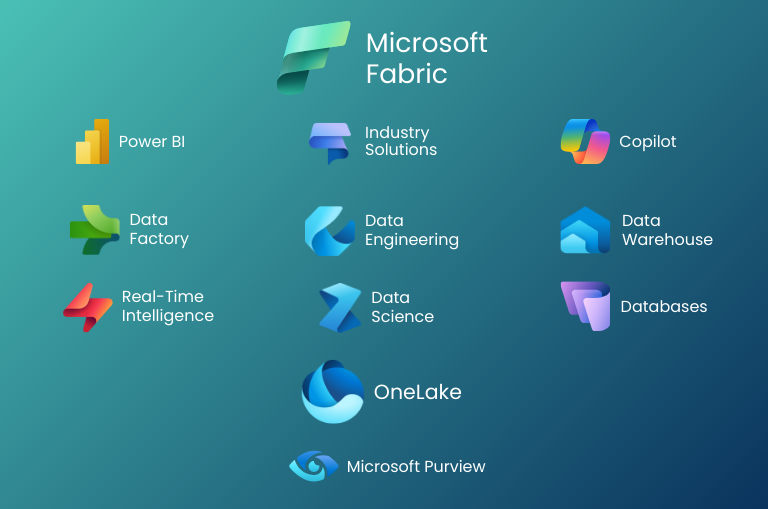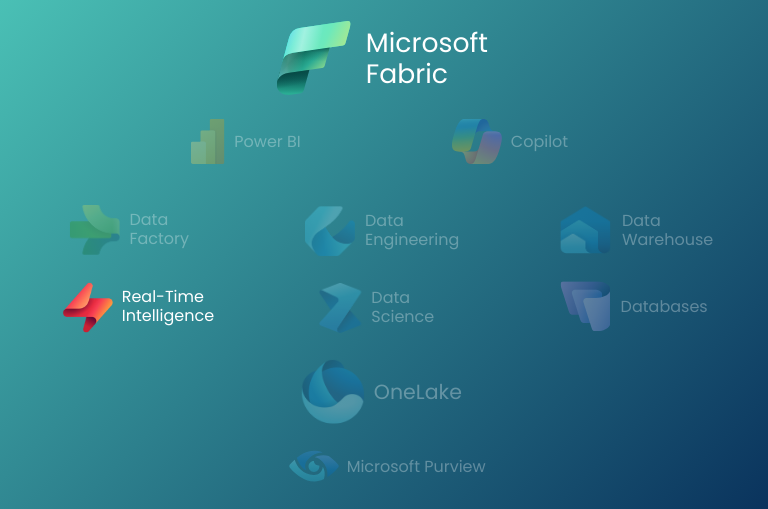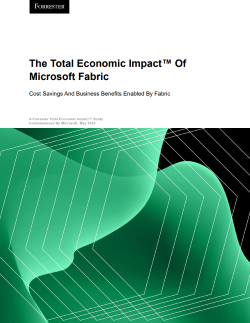What is Real-time Intelligence in Microsoft Fabric
Artificial intelligence opens the door to unprecedented business opportunities, but the key to unlocking them is readiness for deep transformation. It is not only about implementing AI tools, but about strategically redesigning the synergy between data, people, and technology.
In a dynamic business environment, companies need practical tools for instant data stream analysis and decision-making almost in real time. In the context of global competition, the ability to react so quickly becomes the foundation of innovation and a key element in building sustainable market advantage.
That is why more and more organisations choose integrated AI-powered analytics platforms such as Microsoft Fabric, which offer flexibility, scalability, and intuitiveness. Thanks to advanced features like Microsoft Fabric Real-Time Intelligence, companies can not only collect and efficiently process streaming data in real time but also immediately act on the insights, while supporting the development and creativity of their teams.
What is Microsoft Fabric?
Microsoft Fabric is a comprehensive, integrated data and analytics platform designed for enterprises looking for a simple yet versatile solution for collecting, processing, and analysing information. The platform operates in a SaaS (Software as a Service) model, ensuring ease of use, high scalability, and security.
The key premise of the platform is the unification of resources and services in one cohesive environment. Instead of integrating solutions from different vendors, Microsoft Fabric offers a unified cloud-based technology stack on Microsoft Azure, which streamlines work for both business teams and IT specialists.
Data in Microsoft Fabric is stored in OneLake – a central repository that eliminates the need to use multiple, often scattered, data storage systems. This allows companies to manage access more efficiently, maintain data consistency, and ensure compliance with regulations.
Built-in artificial intelligence (AI) mechanisms help better understand the data and use it in Microsoft Azure AI Services and specific applications, from real-time reporting to advanced machine learning modelling available in Microsoft Azure AI Foundry.
One of the most innovative elements of the platform is Microsoft 365 Copilot, an integral part of Fabric. Copilot is an assistant based on generative artificial intelligence (GenAI) that automates routine tasks, fills gaps in expertise, and suggests optimal operations on data. As a result, users can more quickly create reports, formulate queries, and implement data engineering processes without writing complex scripts.
Moreover, Copilot analyses the data context and tailors suggestions to specific business needs. Consequently, organisations using Microsoft Fabric, supported by Microsoft Copilot, gain an integrated environment for efficiently combining data from various sources such as Microsoft Dynamics 365 Sales, designing advanced analytical pipelines, and using machine learning algorithms, as well as ready-made large (LLM) and small (SLM) models in daily work.
This cohesive platform significantly reduces administrative costs, accelerates the deployment of new projects in Power Platform and Microsoft Copilot Studio, and effectively supports teams at every level in maximising the potential of information.
What applications are included in Microsoft Fabric?
Microsoft Fabric is a suite of services with broad application across the entire data processing and analysis cycle. It offers a unified platform where each component plays a key role in the ecosystem.

This gives companies versatile tools for data migration, management, and analysis, as well as for creating innovative AI solutions.
- Fabric Data Factory - This is a modern tool for integrating and preparing data from various sources. It allows the automation of ETL/ELT processes, task scheduling, and fast transfer of even gigantic volumes of information to target data warehouses. In addition to a rich library of connectors, Data Factory provides mechanisms functional in AI transformation, such as built-in support for intelligent data flows. Thanks to its simple interface, both experienced programmers and business specialists can quickly create data pipelines without the need to write complicated scripts.
- Fabric Data Engineering - A module created for teams specialising in advanced calculations and data engineering. It offers a Spark cluster-based environment, enabling fast processing of massive datasets and integration with other Fabric components. This fosters the creation of scalable machine learning projects, supported by configurable tools and libraries.
- Fabric Data Warehouse - A high-performance data warehouse designed with scalability and flexibility in mind. It allows the separation of computing resources from storage, enabling users to manage performance and costs independently. It supports the native Delta Lake format and integrates seamlessly with other services.
- Fabric Databases - Facilitate the management of relational and custom data structures in a centralised environment. They allow quick replication of data from various sources and consistent scaling for transactional and analytical applications.
- Fabric Data Science - A module that simplifies the design, training, and deployment of machine learning models. It supports integration with Azure Machine Learning and provides a set of tools that facilitate experiments and model lifecycle management.
- Fabric Real-time Intelligence - Provides instant collection and processing of streaming data, enabling real-time event monitoring and log analysis. This allows companies to respond quickly to dynamically changing business conditions based on current data.
- Fabric Power BI - A well-known and valued tool for visualisation and interactive data analysis. In the Fabric environment, it provides easy access to all resources in OneLake, speeding up the creation of reports and dashboards.
- Copilot in Fabric - Copilot is an AI assistant that supports users in automating tasks related to data transformation, cleaning, and modelling. Its ability to generate suggestions and code significantly accelerates the implementation of new analytical processes and learning how to use the platform.
- Fabric OneLake - A central data repository where all files and tables are collected. Thanks to consistent storage, information can be easily shared across different Fabric moduless and data duplication can be avoided.
- Microsoft Purview - A comprehensive solution for data governance and security. It allows monitoring the flow of information within Fabric and establishing governance and compliance policies.
- Fabric Industry Solutions - Provides dedicated industry-specific data solutions that form a solid foundation for data management, analysis, and key decision-making. These solutions address the specific challenges of different sectors, enabling companies to optimise processes, combine data from many sources, and use advanced analytical tools.
Microsoft Fabric combines all these areas into a unified data platform, offering the most comprehensive solution for big data analysis across the industry. Fabric enables organisations and individuals to transform large and complex data repositories into practical working solutions and business insights.
Real-time analytics systems
Cloud-based real-time information collection systems, built on unified data platforms, play a key role in modern business analytics. In 2025, their growth is driven by the integration of artificial intelligence (AI), process automation, and the growing demand for rapid decision-making.
These platforms enable organisations to analyse data in real time, allowing dynamic adaptation of business strategies. Key trends include AI and ML (Machine Learning) integration to predict customer behaviour, automate operations, and minimise data processing delays. Moreover, the growing popularity of data mesh architectures decentralises data management, increasing flexibility and operational efficiency.
- IDC predicts that by 2025, about 30% of global data will be generated in real time, highlighting the importance of fast data analysis systems.
- According to Gartner, by 2026, 20% of large enterprises will implement unified data and analytics management platforms to automate processes and improve data consistency.
- Research by KX Systems found that 80% of companies using real-time analytics reported revenue growth, and 62% improved process efficiency.
- OpenMLDB, a real-time feature computation system, reduced data processing delays by several seconds compared to traditional solutions.
- The DataLab platform achieved a 58.58% accuracy increase and a 61.65% reduction in operating costs thanks to integrating language models and unifying BI processes.
The cloud analytics market is moving toward greater automation and decentralisation. Unified data platforms are becoming the foundation for advanced AI and ML applications, enabling organisations to respond faster to changing market conditions and optimise business processes.
What is Fabric Real-time Intelligence
Fabric Real-time Intelligence is a fully integrated component of the Microsoft Fabric platform that enables data-in-motion processing – from collection and transformation to analysis, visualisation, and automated real-time actions.

This allows companies to monitor key metrics, respond to unforeseen events, or quickly detect new opportunities. In practice, this means effective analysis of data streams from applications, sensors, or marketing campaigns, all in one integrated environment.
Within Fabric Real-time Intelligence (RTI), the central element is the Real-Time hub, which collects and coordinates the flow of information from various sources, both from the cloud and on-premises systems. This enables instant anomaly detection or response to business events based on historical and current data. Furthermore, Real-time Intelligence allows automated routing of data to appropriate tools, integration with modules such as Data Factory or Data Warehouse, and securing and managing this information consistently.
A key advantage of Fabric Real-time Intelligence is the built-in AI layer that supports users at every stage of work. With the latest Copilot capabilities in Microsoft Fabric, analysts and team leaders can ask questions in natural language and receive query suggestions that automatically search even massive datasets.
The system also allows creating advanced reaction rules – for example, if the conversion rate suddenly drops, it can automatically send an alert or implement a corrective action in marketing tools. The solution also proves useful in the field of machine learning – Fabric Real-time Intelligence supports integration with AI models, facilitates training, and makes algorithms available.
Users can thus quickly prepare intelligent recommendations or predictive analyses, significantly accelerating the pace of business data usage.
Who is Fabric Real-time Intelligence for?
Fabric Real-time Intelligence is designed for people who need fast, integrated access to current data, regardless of their technical expertise.
Managers wanting to make real-time decisions will appreciate clear dashboards and alerts. Marketing and sales specialists will gain insight into customer behaviour, campaigns, or demand indicators on an ongoing basis.
Analysts and data scientists, on the other hand, will be able to work with data streams and create complex AI models without wasting time configuring external systems.
This allows every department in a company, from finance to HR, to use current information, respond to changes, and ultimately improve overall organisational efficiency.
How to use Fabric Real-time Intelligence in business?
Fabric Real-time Intelligence can be applied in business in many ways:
- Live monitoring: Tracking key metrics in real time, such as e-commerce turnover or warehouse rotation.
- Fast reaction: Automatic alerts about irregularities, enabling immediate corrective actions.
- Process integration: Connecting Fabric Real-time Intelligence with other Microsoft Fabric modules (Data Factory, Data Warehouse) to smoothly transfer data between systems.
- Reporting and visualisations: Creating dynamic dashboards to continuously analyse results and share them with stakeholders.
- AI support: Built-in Copilot in Fabric Real-time Intelligence to facilitate query formulation and data interpretation.
What are the benefits of using Fabric Real-time Intelligence?
Above all, Fabric Real-time Intelligence reduces the time needed to acquire and analyse data, resulting in instant decision-making.
Thanks to the cohesive platform, users do not need to switch between different tools – everything is in one place. Integrated security and management ensure that information is protected at every stage. The intelligent AI layer further supports the analytical process by suggesting optimal actions and detecting potential errors. As a result, downtime is eliminated, operational flexibility increases, and organisational management becomes more transparent. This holistic approach makes Real-time Intelligence a proven foundation for organisations striving for continuous growth and digital innovation.
What are the benefits of using Fabric Real-time Intelligence in a company’s AI transformation?
Integrating Real-time Intelligence with a company’s AI processes offers many advantages:
- Quick adaptation to change: Automatic detection of trends or data anomalies, enabling immediate reaction.
- Enhanced AI models: Integration with Data Science modules in Microsoft Fabric creates conditions for continuous training and improvement of algorithms.
- Personalised insights: Copilot in Fabric helps analyse data in natural language, reducing the need for complex queries.
- Simpler access to knowledge: Transparent and integrated OneLake repository facilitates data sharing and eliminates information silos.
- Scalability and flexibility: Ability to tailor the tool to various needs, regardless of company size or industry.
How does Real-time Intelligence integrate with other Microsoft Fabric modules?
Microsoft Fabric is designed as an integrated platform where each module – from Data Engineering through Data Factory to Power BI – works with one central resource, OneLake.
Fabric Real-time Intelligence can collect data from streaming sources and then send it to Data Factory for further processing and enrichment. The information can then be sent tothe Data Warehouse, where it is ready for exploration using analytical tools. Copilot serves here as an “assistant” that facilitates creating complex queries, suggestions, or automatic improvements.
This keeps the entire Microsoft Fabric ecosystem consistent and easy to manage, with data flowing freely between modules.
Return on investment from implementing the unified Microsoft Fabric data platform

The Forrester report The Total Economic Impact™ Of Microsoft Fabric (TEI) shows that Microsoft Fabric delivers 379% return on investment (ROI) over three years with 9.79 million USD NPV. Analysing a company with revenues of 5 billion USD, Fabric increased data engineer productivity by 25% (1.8 million USD savings), increased business analyst efficiency by 20% (4.8 million USD savings) and generated 3.6 million USD in profits through better decisions.
Infrastructure savings reached 779 thousand USD, and employee retention improved by 8%. The unified platform integrates data engineering, storage, science, and real-time analytics, eliminating silos. The SaaS model and intuitive interface enable data availability across the organisation, supporting data-driven strategies, according to the Forrester TEI study commissioned by Microsoft.
Infrastructure savings reached USD 779,000, and employee retention improved by 8%. The unified platform integrates data engineering, warehousing, science, and real-time analytics, eliminating silos. The SaaS model and intuitive interface enable organisation-wide data availability, supporting data-driven strategies, according to the Forrester TEI study commissioned by Microsoft.
Summary
Investing in Microsoft Fabric Real-time Intelligence is not just purchasing another tool, but above all, an opportunity for deep organisational culture change. Today’s rapidly changing market conditions mean that companies need solutions that enable instant responses to situations in the field, in online stores, or during marketing campaign rollouts.
The joint implementation of Microsoft Fabric with the Real-time Intelligence (RTI) module, Power BI, and Microsoft 365 Copilot creates a powerful ecosystem for immediate analysis and action. Fabric RTI enables instant capture, processing, and analysis of streaming data (e.g., from IoT, logs). Implementing Microsoft Power BI visualises this dynamic live data alongside historical data, providing a complete picture of the situation and supporting real-time decision-making. Implementing Microsoft 365 Copilot integrates this data and AI insights into daily work in Microsoft 365 applications, increasing productivity and supporting quick reactions. The result is an organisation capable of proactive decisions, on-the-fly operations optimisation, and rapid response to market changes.
Most importantly, Fabric Real-time Intelligence fits into the broader idea of AI transformation, where data and technology go hand in hand with human creativity. Instead of fearing complex procedures, employees can focus on finding innovative solutions, with the system in the background ensuring data quality and security.

